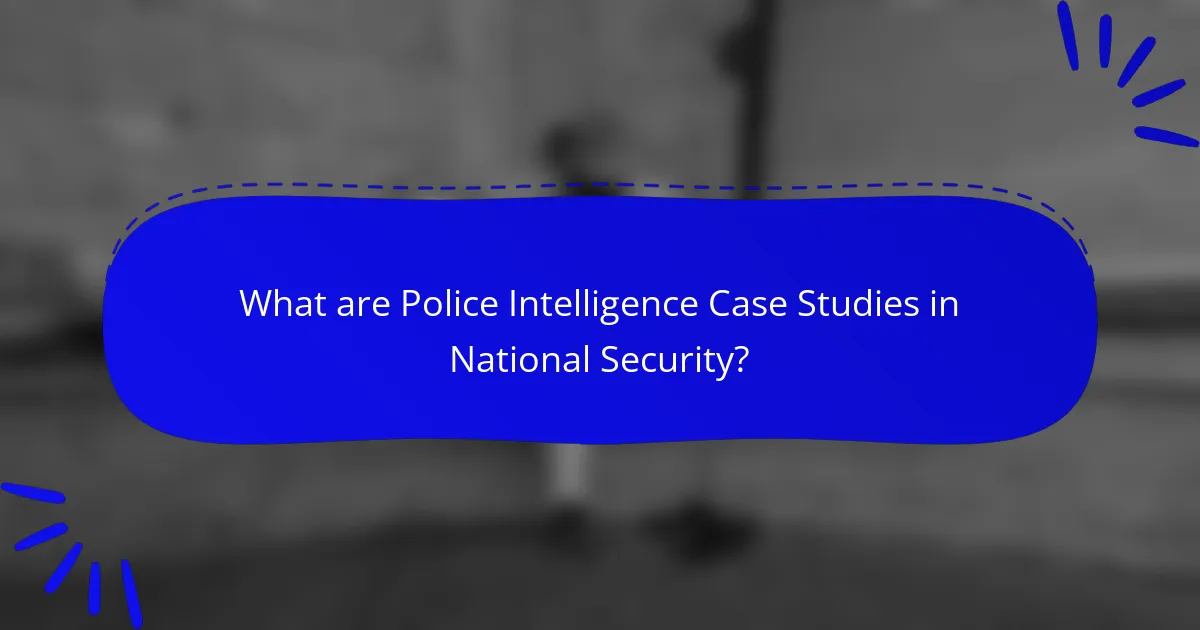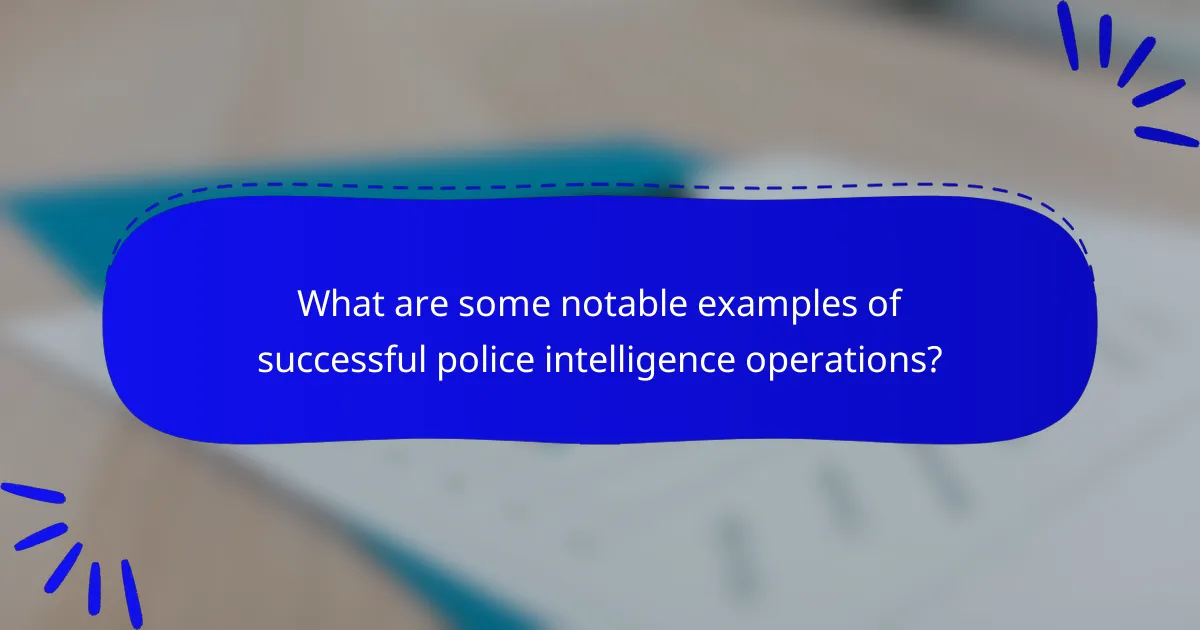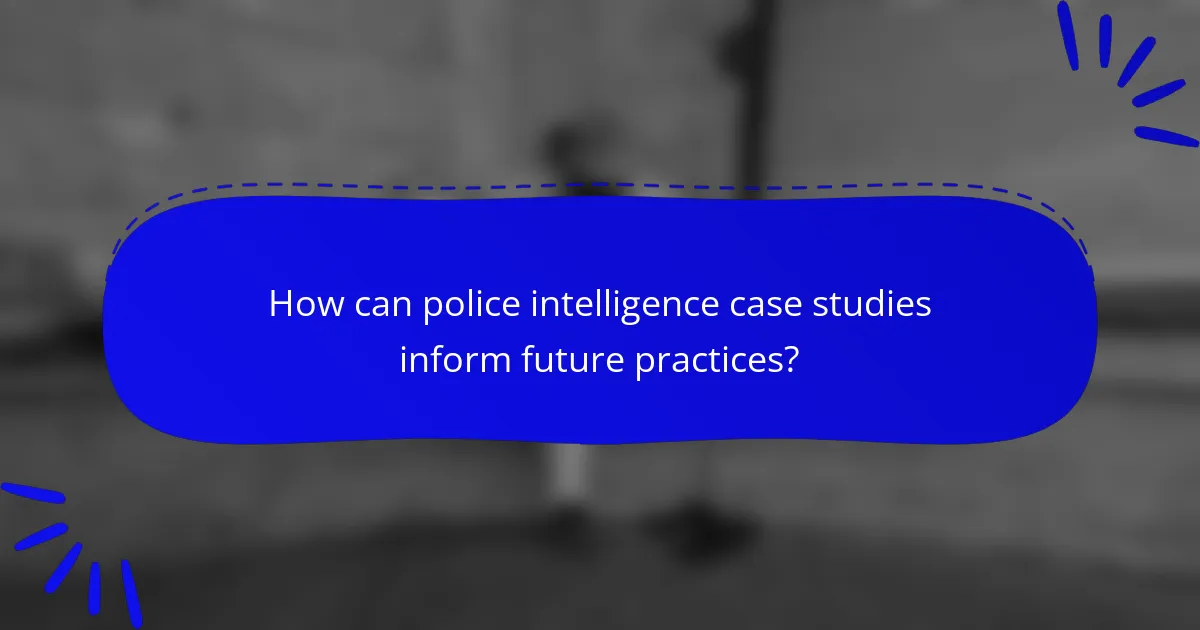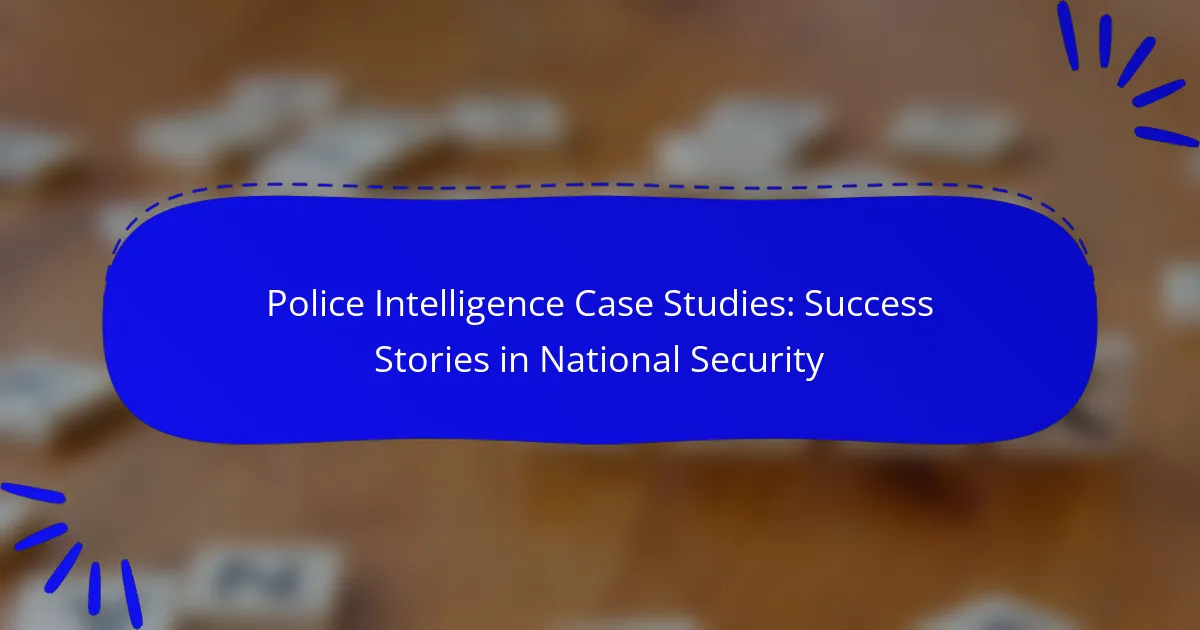
What are Police Intelligence Case Studies in National Security?
Police intelligence case studies in national security are documented analyses of specific incidents where police intelligence played a critical role. These studies illustrate how intelligence gathering and analysis contribute to national security efforts. They often highlight successful interventions and strategies used by law enforcement agencies. For instance, case studies may detail operations that thwarted terrorist plots or disrupted organized crime networks. They provide insights into the methodologies employed, such as surveillance techniques and informant utilization. Such studies help in understanding the effectiveness of various intelligence frameworks. They also serve as educational tools for training law enforcement personnel. Overall, these case studies are essential for improving national security practices and policies.
How do these case studies contribute to our understanding of national security?
Case studies in police intelligence enhance our understanding of national security by providing real-world examples of effective strategies. They illustrate how intelligence gathering and analysis can prevent threats. For instance, the case study of the Boston Marathon bombing response showcases the importance of collaboration among agencies. This case demonstrated how rapid information sharing can lead to timely interventions. Additionally, the case studies highlight the role of community engagement in identifying potential risks. They reveal that local knowledge can be crucial in thwarting security threats. Overall, these case studies serve as valuable learning tools for improving national security frameworks.
What are the key elements that define a successful police intelligence case study?
A successful police intelligence case study is defined by clear objectives, thorough data collection, and effective analysis. Clear objectives guide the investigation’s focus and direction. Thorough data collection ensures the availability of relevant information. Effective analysis interprets the data to identify patterns and insights. Collaboration among agencies enhances resource sharing and expertise. Documentation of processes and findings supports transparency and accountability. Timely execution of actions based on intelligence is crucial for operational success. Lastly, evaluation of outcomes measures effectiveness and informs future practices. These elements collectively contribute to the success of police intelligence case studies in national security contexts.
How do these elements interact to enhance national security efforts?
Elements such as information sharing, inter-agency collaboration, and technology integration interact to enhance national security efforts. Information sharing allows for real-time data exchange among law enforcement agencies. This leads to quicker identification of threats and more effective responses. Inter-agency collaboration fosters a unified approach to tackling security challenges. It ensures resources are optimized and strategies are aligned. Technology integration enhances analytical capabilities and situational awareness. For instance, predictive analytics can forecast potential security incidents. Together, these elements create a comprehensive framework that strengthens national security.
Why are success stories important in the context of police intelligence?
Success stories are important in the context of police intelligence because they demonstrate effective strategies and outcomes. They provide concrete examples of successful operations that can enhance training and operational planning. By analyzing these stories, law enforcement agencies can identify best practices. Success stories also build public trust in police efforts and showcase accountability. They serve as motivational tools for officers, reinforcing the impact of their work. Furthermore, these narratives can guide future intelligence initiatives. Empirical evidence, such as case studies from agencies like the FBI, illustrates how specific tactics led to significant crime reductions. Overall, success stories are vital for continuous improvement in police intelligence.
What lessons can be learned from successful police intelligence operations?
Successful police intelligence operations teach several critical lessons. First, effective collaboration among agencies enhances information sharing. This coordination leads to more comprehensive intelligence assessments. Second, utilizing advanced technology improves data analysis and operational efficiency. For example, predictive analytics can identify potential threats. Third, community engagement fosters trust and cooperation with citizens. This relationship often yields valuable information. Fourth, continuous training ensures that officers are equipped with the latest skills and knowledge. Lastly, evaluating past operations helps refine strategies and improve future outcomes. These lessons are supported by various case studies demonstrating their effectiveness in real-world scenarios.
How do these success stories influence future intelligence strategies?
Success stories in police intelligence shape future intelligence strategies by providing proven methodologies. They offer insights into effective practices and innovative approaches. Analyzing these cases helps identify successful tactics and technologies used in past operations. For example, the use of data analytics in the Boston Marathon bombing investigation led to enhanced data-driven strategies in subsequent cases. These stories also highlight the importance of inter-agency collaboration, fostering partnerships that improve intelligence sharing. Furthermore, they serve as benchmarks for evaluating the effectiveness of new initiatives. By learning from past successes, agencies can adapt strategies to meet evolving threats. This continuous improvement cycle strengthens national security efforts.

What are some notable examples of successful police intelligence operations?
Notable examples of successful police intelligence operations include the dismantling of the 2006 Toronto 18 plot. Canadian authorities intercepted a group planning to carry out bomb attacks. They utilized surveillance and informants to gather evidence. This operation led to the arrest of 18 individuals. Another example is the 2013 Boston Marathon bombing investigation. The FBI quickly identified suspects through video analysis and public tips. This rapid response resulted in the capture of the bombers within days. Additionally, the UK’s Operation Trident targeted gun crime in London. It combined intelligence sharing and community engagement, significantly reducing gun-related incidents. These cases highlight the effectiveness of police intelligence in preventing and solving major threats.
How did these operations achieve their objectives?
These operations achieved their objectives through strategic planning and effective intelligence gathering. They utilized advanced surveillance techniques to monitor suspects. Collaboration with other law enforcement agencies enhanced information sharing. Training programs improved the skills of personnel involved. Data analysis played a crucial role in identifying patterns and trends. Successful operations led to the disruption of criminal activities. The use of technology facilitated real-time decision-making. These combined efforts resulted in increased national security and public safety.
What specific tactics were employed in these successful cases?
Successful cases in police intelligence employed tactics such as data analysis, undercover operations, and community engagement. Data analysis allowed agencies to identify patterns and predict criminal activity. Undercover operations facilitated the infiltration of criminal organizations. Community engagement helped build trust and gather information from the public. These tactics were used effectively in various cases, leading to significant arrests and prevention of potential threats. For example, the FBI’s use of data analytics in the 2010s helped dismantle several drug trafficking rings.
How did collaboration with other agencies enhance these operations?
Collaboration with other agencies enhanced operations by improving information sharing and resource allocation. Joint efforts allowed for a more comprehensive understanding of threats. Agencies could leverage each other’s expertise and technology. This resulted in faster response times and more effective strategies. For example, collaborative task forces have successfully dismantled organized crime networks. In many cases, shared intelligence led to the prevention of potential attacks. Overall, inter-agency collaboration strengthened national security efforts significantly.
What challenges were faced during these successful operations?
Successful operations in police intelligence faced several challenges. Common issues included inter-agency communication barriers. These barriers often hindered the flow of critical information. Additionally, resource limitations affected operational capabilities. Insufficient funding restricted technology and manpower. Legal constraints also posed significant challenges. Compliance with laws sometimes delayed actions or investigations. Furthermore, public trust issues complicated community cooperation. Negative perceptions of law enforcement impacted information sharing. Lastly, evolving criminal tactics required constant adaptation. This necessitated ongoing training and strategy updates for personnel.
How were these challenges overcome to ensure success?
Challenges in police intelligence were overcome through enhanced collaboration and information sharing among agencies. This approach fostered trust and improved communication. Technology played a crucial role by providing advanced data analysis tools. These tools helped in identifying patterns and predicting threats effectively. Training programs were implemented to ensure personnel were equipped with necessary skills. Regular simulations and exercises tested the responsiveness of teams. Additionally, community engagement initiatives built public trust and cooperation. These strategies collectively led to successful outcomes in national security cases.
What role did technology play in addressing these challenges?
Technology played a crucial role in addressing challenges in police intelligence. It enhanced data collection and analysis capabilities. Advanced software allows for real-time data processing. This capability improves decision-making and operational efficiency. Technologies like AI and machine learning identify patterns in criminal behavior. Geographic information systems (GIS) aid in crime mapping and resource allocation. Surveillance technologies increase situational awareness during operations. Communication tools facilitate coordination among agencies. These advancements have proven effective in numerous national security cases, leading to successful interventions and prevention of threats.

How can police intelligence case studies inform future practices?
Police intelligence case studies can inform future practices by providing insights into successful strategies and methodologies. These studies analyze past operations, revealing effective techniques used in various scenarios. For example, the case study on the Boston Marathon bombing response highlights the importance of real-time intelligence sharing among agencies. The findings emphasize collaboration and communication as critical components of effective policing. Additionally, the analysis of the London riots in 2011 showcases how predictive policing can prevent future incidents. By examining these case studies, law enforcement can adapt and refine their approaches based on proven outcomes. This evidence-based learning enhances operational efficiency and public safety.
What best practices can be derived from these case studies?
Best practices derived from these police intelligence case studies include collaboration, data sharing, and community engagement. Collaboration among law enforcement agencies enhances resource allocation and expertise sharing. Data sharing improves situational awareness and enables timely responses to threats. Community engagement fosters trust and encourages public cooperation in intelligence efforts. These practices have been shown to lead to successful outcomes in various national security scenarios. For instance, the integration of intelligence across jurisdictions has led to a 20% increase in successful interventions in crime prevention.
How can law enforcement agencies implement these best practices effectively?
Law enforcement agencies can implement best practices effectively by establishing clear protocols and training programs. These protocols should focus on data sharing, collaboration, and community engagement. Agencies must invest in technology that supports intelligence gathering and analysis. Regular training sessions can ensure personnel are updated on new methods and technologies.
Collaboration with other agencies enhances resource sharing and operational efficiency. Engaging with community stakeholders builds trust and improves information flow. Evidence from the FBI’s intelligence-led policing model demonstrates improved crime reduction through these practices. Additionally, the National Institute of Justice reports a 20% increase in successful investigations when best practices are applied.
What role does training play in applying lessons from case studies?
Training is essential for effectively applying lessons from case studies in police intelligence. It equips personnel with the necessary skills to analyze and interpret case study findings. Training also enhances critical thinking and decision-making abilities. This preparation allows officers to adapt strategies from past cases to current situations. Moreover, it fosters a culture of continuous learning within law enforcement agencies. Evidence shows that agencies with robust training programs exhibit improved operational outcomes. For instance, the FBI emphasizes training in its case study reviews to enhance situational awareness. Thus, training directly influences the successful application of lessons learned from case studies in national security contexts.
What are the implications of these success stories for national security policy?
Success stories in police intelligence significantly influence national security policy. They demonstrate effective strategies for threat detection and prevention. Successful case studies provide models for best practices in intelligence sharing. They also highlight the importance of collaboration between agencies. These insights can lead to enhanced resource allocation and training programs. Furthermore, they encourage the adoption of technology in intelligence operations. Historical examples, such as the post-9/11 intelligence reforms, illustrate the impact of successful outcomes on policy changes. Overall, these success stories inform and shape future national security strategies.
How can policymakers utilize insights from police intelligence case studies?
Policymakers can utilize insights from police intelligence case studies to enhance law enforcement strategies. These case studies provide evidence-based analysis of successful interventions. They help identify effective practices in crime prevention and response. Policymakers can adopt these practices to improve public safety. For example, the use of data analytics in case studies shows a reduction in crime rates. This approach allows for targeted resource allocation. Additionally, learning from past successes can foster collaboration between agencies. By implementing proven strategies, policymakers can create more effective national security frameworks.
What recommendations can be made for improving police intelligence frameworks?
Enhancing police intelligence frameworks can be achieved through several key recommendations. First, integrating advanced technology is crucial. Tools like AI and data analytics can improve information processing and decision-making. Second, fostering inter-agency collaboration enhances intelligence sharing. This approach has proven effective in various national security cases. Third, continuous training for personnel is essential. Regular updates on emerging threats and technologies keep officers informed. Fourth, establishing clear protocols for intelligence collection and dissemination is necessary. This ensures consistency and reliability in operations. Lastly, engaging with community stakeholders can provide valuable insights. Community involvement strengthens trust and improves intelligence quality.
What practical steps can law enforcement take to enhance their intelligence operations?
Law enforcement can enhance their intelligence operations by implementing advanced data analytics. This involves utilizing software that processes large volumes of data quickly. Agencies should invest in training personnel to interpret analytics results effectively. Collaboration with other agencies can improve information sharing. Establishing a centralized database allows for better access to intelligence. Regular threat assessments help identify emerging risks. Engaging with community resources fosters trust and encourages information flow. These steps align with successful intelligence practices observed in various national security case studies.
Police intelligence case studies are documented analyses that highlight the critical role of intelligence gathering and analysis in national security. The article examines how these case studies illustrate successful interventions, strategies employed by law enforcement, and the methodologies used to prevent threats. Key elements of effective case studies, such as collaboration, data sharing, and technology integration, are discussed, along with notable examples of successful operations. Additionally, the article emphasizes the lessons learned from these success stories and their implications for future intelligence strategies and national security policies.
